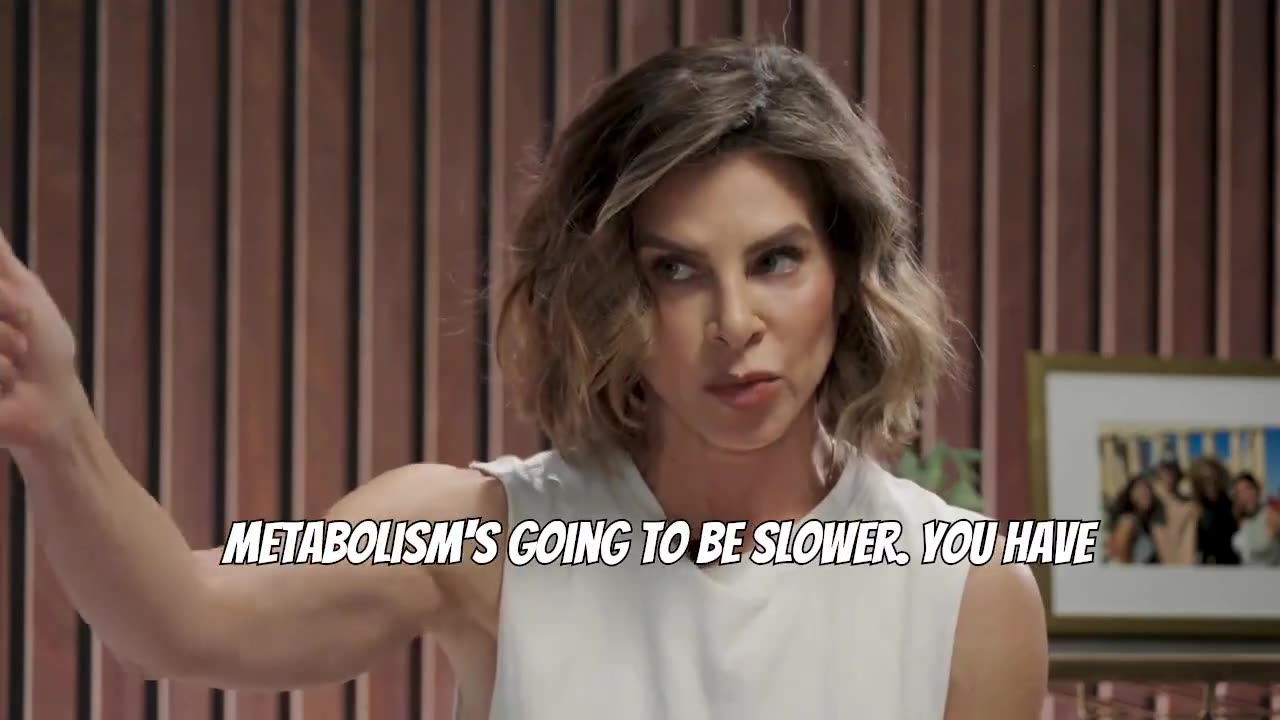Premium Only Content

Jillian Michaels: Is Ozempic Damaging to Health?
Jillian Michaels: Is Ozempic Damaging to Health?
"I wanna play devil's advocate. Let's go with a best case scenario, okay? You're one of the 50%, roughly, that has no side effects. Amazing. You've lost a ton of weight. And as a result of that weight loss, you have seen improvements in all your biomarkers associated with heart health.
And even though Ozempic is, semaglutide is not the most effective drug for lowering A1C by any means, you've seen improvements, right? In your A1C, excellent, which is not a result of the medication, it's a result of the weight loss. That is the mechanism by which you are seeing improvements in those aspects of your health, okay?
So if you just lost weight, you'd have all those improvements. No side effects, okay? That said, okay, great. Now we're, this is amazing. We're 18 months into it, we're 60 pounds down. Here's what's going to happen. Let's put you on a time capsule. You will plateau on this drug. Not an opinion. Fact.
Google that. I'm encouraging to Google. Don't trust me. Google it for yourself. You will plateau on the drug. Your body is homeostatic, which means over time it's seeking a balance. GLP-1 is a hormone, incretin, it's a hormone. So when you are giving the body a hormone exogenously, over time the body is like, oh, I'm gonna stop making this on my own, oh, I'm gonna develop a tolerance to this.
Tolerance, yep. And you will plateau on the drugs. Google it. Now then, what are you going to do when they stop working physiologically? Do you think you're going to get off of it? Because you will gain all of the weight back. All of the meta-analyses show us this. Google it. It's not my opinion, okay?
So here's the bigger problem. Now when the drug stops working, if you choose to get off of it, because it's also very expensive, you're handcuffed to this drug for the rest of your life, Google it. Okay, so we get off of it. You've got a couple of issues. Fact, there is quote, let me quote Peter Atia. Hopefully he's more credible than Dr. Terry Dubrow.
He will tell you that in his practice, according to the DEXA scans he does with his patients, he sees muscle loss at a quote, alarming rate. He uses these drugs as a last resort and he won't even put patients on them until he does a DEXA scan to make sure that they're not older and in a dangerous position where they can't afford to lose muscle mass or bone density.
So you've lost muscle mass without question, you've lost and compromised bone density. So your metabolism is going to be slower. You have been starving your body because you aren't eating for such a long period of time that you will then lower your metabolic set point.
So we've seen this, if you look at case studies like the great potato famine, I wrote about this in my book, The Six Keys. By the way, we're the medical researcher interviewing doctors. So what ended up happening to these individuals who went through a period of famine is that it marked their epigenome and passed on a slower metabolism to their offspring.
So your body, when going through a period of famine, says, okay, we know the food's going to be scarce. So we'll make biochemical shifts, hormonally. And it will say, when we eat again, let's make sure we store this. It's yo-yo dieting. Yeah, it's science, it's proven, it's fact.
So now you've lowered your metabolic set point. So let's say you used to burn 1,500 calories a day with that exercise, now you're burning 12. And you've lost muscle, which is gonna lower your metabolism. And you've been giving your body GLP-1 exogenously, so your body's gonna shut off its ability to make that endogenously.
Now, there's not a study about this yet but I'm going to tell you that with any other hormone that we've done this with, whether it's people, there's a reason I don't take HGH. I would love to do that. Nope. This is why. There's a reason that people, when you take these things exogenously, it'll work for a little while, then there's an equilibrium.
That's why when guys get off testosterone, you see what happens. They gain the weight, all these health problems because they were taking it. Exogenously, so now their body isn't making it endogenously. So now this is something that I would presume, that I would draw the following conclusions, that your body probably will not make GLP-1 as effectively when you get off of it.
So there is a devastating rebound effect when people get off the drugs. That's a fact, Google it. I'm guessing it's because of all those reasons that I'm putting forward, but the result is fact. That is our best case scenario. That's the best case. So tell me where we're going here.
Now, people, and this, I just got in this discussion with a doctor the other day, who's a friend, and he's like, but Jill, you know, I have patients that come in here and they've given up hope, and I said, let's play it out together, doc. Like, where are we going? And his hope, he's like, well, my hope is that it kickstarts these healthy habits.
We don't actually know that yet, but. Here's the only reason I would wonder about that is because what is this drug doing? It's combating hunger. So yes, it's facilitating people taking in less calories, which is the mechanism that is facilitating weight loss, right? But what it's actually doing is combating this insatiable hunger.
Why are people so hungry? They weren't this hungry in 1950. They weren't this hungry in 1960. They weren't actually this hungry until about the mid 1970s. And then obesity starts going up exponentially, right? Like, what happened? Yeah. Well, if you look at the food that we are currently eating in our environment, it is designed to be highly palatable, highly addictive.
It does not release GLP-1. It has no fiber. It has no fat. It has no protein. All of those things release certain hormones that say, yo, you're full. Stop eating. Doesn't have any of that. So you can drink 1,000 calories of soda and be starving. Whereas if I gave you a 1,000 calorie dinner that was, let's say, a piece of grass-fed beef and some vegetables and this, you'd be like, oh my God, I'm gonna explode. I can't eat another bite.
So you've got that problem with the food. And the food is also a massive dopamine hit. It's designed to do that. It impacts the dopamine center of your brain like cocaine, nicotine. So that's happening. And then at the same time, I personally think we're lonelier than ever, we're more anxious than ever, we, our lives are more sedentary than ever due to modern day conveniences.
And it's a multifactorial problem that is not solved by a drug that will eventually stop working. It's gonna stop working. And then you've got all the side effects of getting off of it. Now let's play out our worst case scenario, which is stomach paralysis, intestinal blockage, pancreatitis, kidney failure, gallbladder problems, muscle loss, accelerated facial aging, hair loss, suicidal ideation. Like, are you kidding? My God.
Like, I'm just, why am I out here alone? I get these messages from friends of mine who are doctors, because by the way, all I do all day long on my podcast is interview doctors. And on the download, like if I could show you my phone, they arm me with these studies quietly behind closed doors. And I'm like, well, thanks, but anybody?
And the reason they can't come out and say it is like some of them get their grant money from the pharmaceutical companies. All comes full circle with the pockets getting lined and big pharma. How much money do you think big pharma pays these doctors? That's what I wanna know. In particular, Novo Nordisk, how much money have they spent buying doctors to prescribe these drugs?
Millions and millions and millions of, Google it. This is Google it. Hashtag Google it. Google it. It's all public, it's public information. But this is why we need you. This is why so many of us love you and are grateful because sadly it takes courage to say what you're saying. Would you agree? I wouldn't say it takes courage."
Source: https://x.com/newstart_2024/status/1851609714326474952
-
 1:22
1:22
Canadian Citizens Journal
1 day agoElizabeth May calls for new taxes on Canadians to fund more foreign assistance
471 -
 LIVE
LIVE
Spartan (Pro Halo esports Player)
5 hours agoSdcrims no comms, then College match
143 watching -
 34:43
34:43
Stephen Gardner
3 hours ago🚨Trump Lawyer makes TWO HUGE ANNOUNCEMENTS | Benny Johnson
26.9K20 -
 2:17:31
2:17:31
Robert Gouveia
4 hours agoJudge BLOCKS Proof-of-Citizenship! Trump BACK to Supreme Court! Deportee Discovery STAYED!
36.5K16 -
 LIVE
LIVE
MyronGainesX
18 hours ago $11.24 earnedCollege Debate Reaction, Jordan Peterson Sells Out, Shannon Sharpe Shakedown!
2,143 watching -
 LIVE
LIVE
Lilpaul112
3 hours agoSolos On the Island / Repo Time With the Brrrap Pack Gang!
132 watching -
 1:33:35
1:33:35
theoriginalmarkz
3 hours agoEvening News with MarkZ, joined by Jonathan Otto. 04/24/2025
40.9K3 -
 LIVE
LIVE
GrimmHollywood
3 hours ago🔴LIVE • GRIMM HOLLYWOOD • REPO with the BRRRAP PACK • THEIR FIRST TIME PLAYING •
49 watching -
 10:10
10:10
Mrgunsngear
3 hours ago $1.07 earnedNew Trijicon MRO SD - The Best American Made Red Dot Optic?
19.8K5 -
 LIVE
LIVE
Game On!
12 hours ago $2.22 earned2025 NFL Draft Live Coverage and Reaction!
61 watching